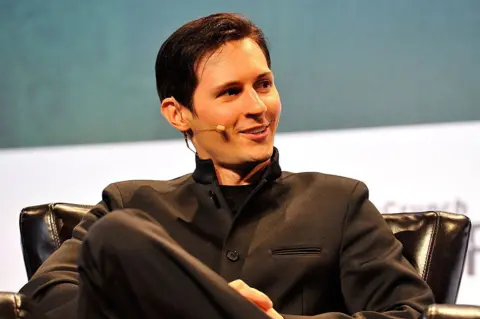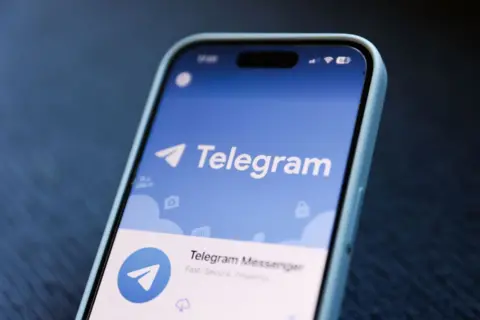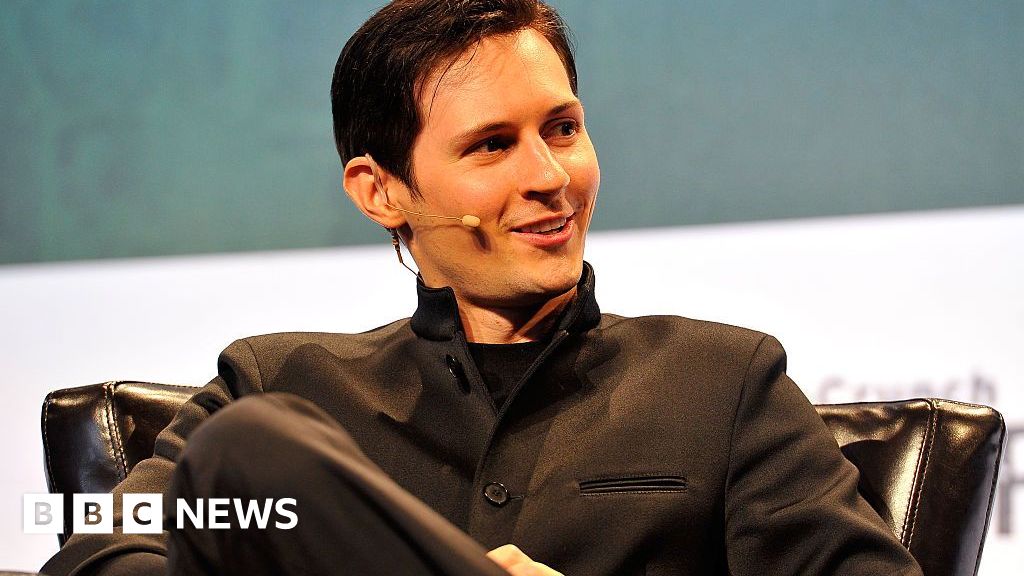 Getty Images
Getty ImagesPavel Durov, the CEO of messaging app Telegram, has been arrested in France.
According to officials, the arrest was under a warrant for offences related to the app and the investigation is reportedly about insufficient moderation, with Mr Durov accused of failing to take steps to curb criminal uses of Telegram.
Telegram said in a statement that “it is absurd to claim that a platform or its owner is responsible for abuse of that platform”.
Who is Pavel Durov?
Mr Durov, 39, is a multi-billionaire who is originally from Russia.
He founded the popular Russian social media company VKontakte.
In 2014, Mr Durov left Russia after refusing to comply with government demands to shut down opposition communities on the platform.
A year earlier, he had founded Telegram and now runs the firm from Dubai in the United Arab Emirates (UAE) where he now lives.
He holds citizenship of the UAE and France, but Russia has said it still regards him as a citizen.
Telegram said Mr Durov travels in Europe frequently.
In an interview with the conservative US media personality Tucker Carlson in April, Mr Durov said he would refuse certain requests from authorities to remove content from his platform.
He said: “Where we thought it would be crossing the line – it wouldn’t be aligning with our values of freedom of speech and protecting people’s private correspondence – we would ignore.”
What is Telegram?
 Getty Images
Getty ImagesTelegram is one of the world’s biggest social media and messaging platforms along with Facebook, WhatsApp, Instagram, TikTok and WeChat.
In July, Mr Durov claimed that Telegram reached 950 million monthly active users. It is popular in Russia and Ukraine, while pro-democracy groups in Iran and Hong Kong also use it.
Telegram does offer encryption, which means the messages can only be read on the device that sends them and the device that receives them, but this is not the default setting for the user.
The big difference between Telegram and similar services like WhatsApp is the size of groups you can be in on Telegram.
WhatsApp limits group sizes to 1,000 users whereas up to 200,000 can be in a group on Telegram.
The platform has faced criticism that disinformation can spread in these huge groups.
Critics have argued the platform has seen the sharing of conspiracist, neo-Nazi, paedophilic, or terror-related content.
Officials in France have reportedly said its investigation into Mr Durov is about the app’s failure to co-operate with law enforcement over drug trafficking, child sexual abuse and fraud.
In the UK, the app was scrutinised for hosting far-right channels that were instrumental in organising this month’s violent disorder in English cities and cybersecurity experts say its moderation of extremist and illegal content is significantly weaker than other social media companies and messenger apps.
Following Mr Durov’s arrest, Telegram said its moderation “is within industry standards and constantly improving”.
It said it abides by European Union laws, including the Digital Services Act, which aims to ensure a safe and accountable online environment.
“Almost a billion users globally use Telegram as means of communication and as a source of vital information,” the app’s statement read.
“We’re awaiting a prompt resolution of this situation. Telegram is with you all.”
What has been said about Durov’s arrest?
Details are still to emerge from the French authorities as to what Mr Durov has actually been arrested for in relation to Telegram.
However, it is pretty unprecedented for the owner of a social media or messaging platform to be arrested because of content on that platform.
Elon Musk posted #FreePavel on X along with a clip of the Telegram founder talking to Carlson about changes the Tesla and SpaceX billionaire had made after purchasing the site formerly known as Twitter.
Edward Snowden, the American whistleblower who now lives in Russia after revealing extensive internet and phone surveillance by US intelligence, said on X that Mr Durov’s arrest “is an assault on the basic human rights of speech and association”.
He added: “I am surprised and deeply saddened that [French President Emmanuel] Macron has descended to the level of taking hostages as a means for gaining access to private communications. It lowers not only France, but the world.”


